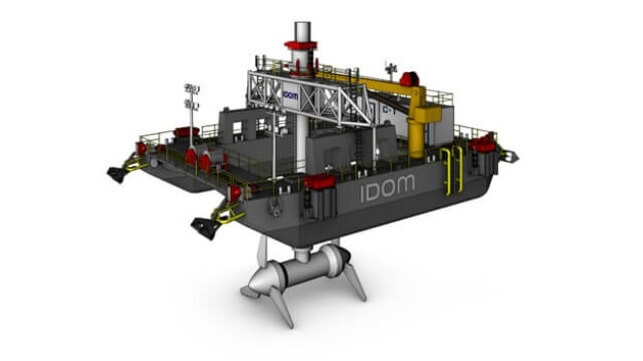Design Efforts Proceeding for Mobile Test Vessel for Tidal Energy

The U.S. Department of Energy in collaboration with engineering firm IDOM and Florida Atlantic University’s Southeast National Marine Renewable Energy Center is moving forward with the plans to develop a vessel designed to test tidal energy technologies in a range of real-world environments. The project, which was selected by DOE in December 2020, has issued a request for information soliciting feedback from developers of current energy converters on how the mobile test vessel can best support the development of energy technologies.
“As the marine energy industry continues to advance technologies towards commercialization, there is an ongoing need for testing at all levels of technological development,” they write in the solicitation for input. “The slow pace of design and in-water testing cycles is further exacerbated by the limited availability of testing infrastructure at various scales, complex and time-consuming permitting processes, and expensive environmental monitoring.”
The vessel concept was proposed by IDOM and Florida Atlantic University in response to the DOE’s effort to support foundational research and development and expand testing capacity to advance the marine energy industry. DOE believes the vessel can address the gap in the testing capabilities as part of its broader program to accelerate research in the field.
Existing testing infrastructure in the U.S. can only accommodate small-scale current energy converters with rotors two to three meters in diameter. DOE believes there is a need for a mobile testing capability that can accommodate CECs with up to eight-meter diameter rotors for testing turbines under different flow conditions in a wide range of test conditions.
The concept for the mobile test vessel (MTV) is that it would accommodate a wide range of turbine types and sizes, current speeds, depths, wave conditions, and seabed types. The MTV would support anchoring and mooring for the testing of CECs in rivers, tides, and or open sea. It would also potentially incorporate an onboard power generation system to support test setup, maintenance, inspection, testing, and services for data acquisition systems.

that matters most
Get the latest maritime news delivered to your inbox daily.
The RFI seeks information from developers and others involved in the research to understand technologies that would utilize the MTV as well as how the MTV can best support the development of CEC technologies and testing. The responses will be used for strategic planning to ensure the MTV’s capabilities are aligned with industry needs. Based on the input, the project seeks to define the MTV’s main requirements and its final configuration.
The effort to develop the designs for the test vessel comes as the DOE announced a new round of grants to support testing of wave energy projects at an offshore facility. DOE awarded $25 million in funding to support eight projects that will make up the first round of open-water testing at the PacWave South test site located off the Oregon coast. Oregon State University is targeting the summer of 2023 for the first tests at its offshore facility.
